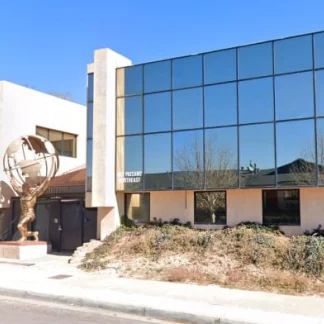First Nations Community Healthsource
First Nations Community Healthsource is a private rehab located in Albuquerque, ...
Crossroads for Women -- Maya's Place is a transitional housing unit for women recovering from alcohol or drug addiction in Albuquerque, New Mexico. They serve adults with a mental health diagnosis, are struggling with addiction, and are referred by the New Mexico or Federal court system. They are a residential facility with modern, home like amenities. Maya's Place is a 26 bed drug rehab facility that exclusively serves women transitioning from a correctional facility. Children and clients' partners cannot stay with them at Maya's Place.
While not a traditional inpatient program, residents of Maya’s Place receive a wide variety of services from staff aimed at helping them overcome addiction and develop the life skills needed to lead happy and productive lives. Therapy occurs at the residence and takes place in group settings, where clients share their experiences and offer support to one another. Therapy aims to explore how substance abuse impacts clients and those close to them, uncover the stressful triggers that lead to addictive behaviors and discover healthy coping mechanisms in their place.
Support staff also provide numerous support services for clients, including case management. Staff provides whole person support to assist clients in achieving stability in every area of their lives. A stay at Maya’s Place depends on the progress of a client but, on average, lasts three months to a year.
Clients take an active role in building their treatment plans. During the application process, they are asked to identify their long term goals, personal strengths, factors that have held them back in the past, and what help they want to reach their goals during and after treatment.
Other mental disorders and illnesses are known to develop alongside addiction. Those living with depression, anxiety, bipolar disorder, and others are more likely to turn to substance abuse as a coping mechanism. Co-occurring disorder treatment seeks to address both problems simultaneously to address addictive behaviors and their roots better.
Co-occurring disorder treatment reduces the risk of future relapse and boosts overall longer term recovery. Co-occurring disorder treatment is integrated into substance abuse treatment.
Contact us for more information: (505) 266-0110

Connect with Crossroads for Women - Maya's Place by calling their admissions team directly.
(505) 266-0110 Website Get DirectionsExperiential therapy is a form of therapy in which clients are encouraged to surface and work through subconscious issues by engaging in real-time experiences. Experiential therapy departs from traditional talk therapy by involving the body, and having clients engage in activities, movements, and physical and emotional expression. This can involve role-play or using props (which can include other people). Experiential therapy can help people process trauma, memories, and emotion quickly, deeply, and in a lasting fashion, leading to substantial and impactful healing.
Group therapy is any therapeutic work that happens in a group (not one-on-one). There are a number of different group therapy modalities, including support groups, experiential therapy, psycho-education, and more. Group therapy involves treatment as well as processing interaction between group members.
Life skills trainings involve all the skills a person must have in order to function successfully in the world. These include time management, career guidance, money management, and effective communication. Truly successful addiction recovery is based on the ability to not only live substance-free, but to thrive. Life skills teaches the practical necessities of functioning in society, which sets clients up for success in life, and therefore sobriety.
Recreational therapy (aka therapeutic recreation) uses creative and fun activities to help with addiction recovery. Recreational therapists lead patients in entertaining and engaging activities like sports or games; art (drawing, painting, sculpture); drama, music, and dance; and/or community outings (field trips) to improve patients' physical, social, and emotional well-being.
Group therapy is any therapeutic work that happens in a group (not one-on-one). There are a number of different group therapy modalities, including support groups, experiential therapy, psycho-education, and more. Group therapy involves treatment as well as processing interaction between group members.
Life skills trainings involve all the skills a person must have in order to function successfully in the world. These include time management, career guidance, money management, and effective communication. Truly successful addiction recovery is based on the ability to not only live substance-free, but to thrive. Life skills teaches the practical necessities of functioning in society, which sets clients up for success in life, and therefore sobriety.
Recreational therapy (aka therapeutic recreation) uses creative and fun activities to help with addiction recovery. Recreational therapists lead patients in entertaining and engaging activities like sports or games; art (drawing, painting, sculpture); drama, music, and dance; and/or community outings (field trips) to improve patients' physical, social, and emotional well-being.
Life skills trainings involve all the skills a person must have in order to function successfully in the world. These include time management, career guidance, money management, and effective communication. Truly successful addiction recovery is based on the ability to not only live substance-free, but to thrive. Life skills teaches the practical necessities of functioning in society, which sets clients up for success in life, and therefore sobriety.
Recreational therapy (aka therapeutic recreation) uses creative and fun activities to help with addiction recovery. Recreational therapists lead patients in entertaining and engaging activities like sports or games; art (drawing, painting, sculpture); drama, music, and dance; and/or community outings (field trips) to improve patients' physical, social, and emotional well-being.
Recreational therapy (aka therapeutic recreation) uses creative and fun activities to help with addiction recovery. Recreational therapists lead patients in entertaining and engaging activities like sports or games; art (drawing, painting, sculpture); drama, music, and dance; and/or community outings (field trips) to improve patients' physical, social, and emotional well-being.
First Nations Community Healthsource is a private rehab located in Albuquerque, ...
Kaseman Presbyterian Hospital Behavioral Health Services offers adults, children...
Shadow Mountain Recovery – Albuquerque Recovery Center is a private rehab locate...
Youth Development – Easterday Notheast is a private rehab located in Albuquerque...